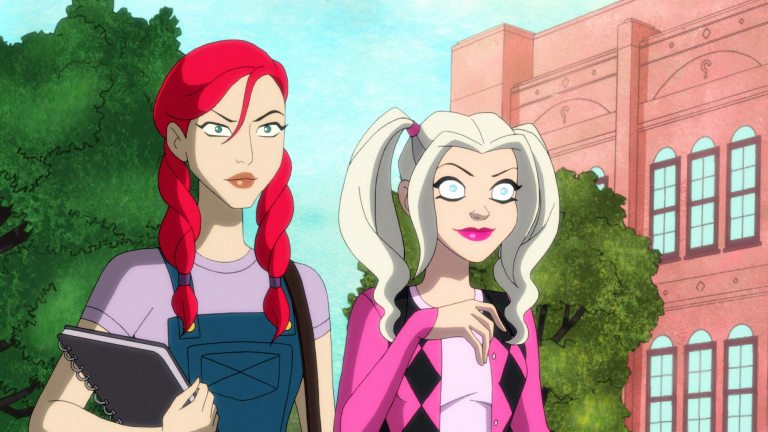This film is an acute study of...Malcolm and Marie, and from there it branches out to cover the bases of relationships, film criticism, filmmaking, the "woke" versions of film criticism and filmmaking, and everything under the sun. It would be exhausting to write about this kind of movie "properly," according to Malcolm, but it was very interesting to watch...even if watching itself is exhausting. So the best way I can write about it is probably in a disjointed fashion. The synopsis, as always, is still a strong start.
The title characters, played by John David Washington and Zendaya | Copyright 2021 Netflix
Direct from Netflix's menu of endless browsing, "As a filmmaker (John
David Washington) and his girlfriend (Zendaya) return home from his movie
premiere, smoldering tensions and painful relations push them toward a romantic
reckoning." It is written and directed by Sam Levinson, and he is also behind
the HBO show
Euphoria, which also stars Zendaya, and the movie
Assassination Nation. I'm probably never going to do a full write up of
Euphoria, so let's give it a few words here, since I already promised
something disjointed.
Euphoria is about high schoolers navigating their everyday life.
Everything is a little bit heightened and exaggerated, but it comes from a
very real place of millennials and younger struggling in a world designed to
disenfranchise and drive them to vices. The best way to make extreme vices
palatable, especially when their part of a self-destructive path, is to make
the visuals and colors pop. It gave Euphoria a beauty and identity that
drew people in to the little details of the characters' lives, while the big
picture was sometimes given through narration. Malcolm & Marie is
in black and white, and it makes a lot of sense, in the context of the show,
because it's all about slowly discovering the intricacies of these two
characters...That's just me reading into things though, and we'll get back to
that.
John David Washington's performance is pretty great, as he makes an
insufferable, and at times cruel and downright abusive, character fun to
watch. It helps that the opening of the movie is him dancing, singing, and
doing everything he can to set himself apart from his father. His energy is
positively infectious. Unfortunately, it's not always channeled well, but
that's not John David Washington's fault. When Malcolm is presenting some of
his arguments about film criticism to Marie, the ratcheting up to eleven makes
him come off like a cartoon character. This is also because Levinson writes
him as some kind of "pull yourself up by your bootstraps" libertarian. He
spouts occasional crap about hard work, not realizing that his work would be a
lot easier, and possibly better, if he collaborated with people more. I think
a conversation of different men comparing themselves to Malcolm could be
incredibly eye-opening. With all that said, Malcolm's commitment to his
point-of-view and learning more about what makes him tick made his
insufferable and cruel moments, and his narcissistic personality, and the
overall movie, more engaging, personally.
Zendaya gives one of the best performances of the year. It pains me to say
that as someone who was absolutely floored by Promising Young Woman and
Carey Mulligan. Speaking of which, to hear more about that movie and Mulligan,
please check out the site
Next Best Picture. They did a great
podcast episode
on it...I was too intimidated by the movie to review it, but it's one of my
favorites of the year.
Back to this, Zendaya had a more "showy" performance and role, but there are
plenty of smaller moments in it that stood out, too. It's in the ways she
tilts her head and has to take on the form of a statuesque goddess for Marie
to keep, or stop, wrapping Malcolm up in knots throughout the night. It's in
the toe tapping to Dionne Warwick's "Get Rid of Him," which is just one of a
few great music cues. She's also very funny. Her imaginary trajectory of her
boyfriend's career paints a real picture of how people like me consume and
talk about media, for better and worse. There's a lot of moments like that
from both of them, but at least she's tongue-in-cheek about it instead of
taking the stick-up-ass approach.
Between the two, Levinson is even-handed enough with everything he's trying to
say, which is pretty much a stream of consciousness put onscreen...and on
stream, since it's Netflix. And it's mostly just to get people talking in
general, and I like that approach...or I miss talking to people about this
stuff in-person. Either way works. As good as time as any to mention this was
made, start to finish, during the pandemic.
So, the problem with reading into things is it's not how a movie is supposed
to be reviewed, maybe? At least according to Malcolm, context and different
directions the filmmaker could've gone with aren't supposed to be brought up,
just what is presented should be. I haven't looked into it yet, but the movie
is getting a lot of heat for a pretentious view of critics. Levinson, luckily,
may not share these views. He said in an
interview
with Landmark Theatres that it's about presenting all sides of a
subject or argument through Malcolm and Marie. If he keeps in mind that he
can't control the discourse after the movie is out, then we're good.
Levinson also said black and white was chosen because a lot of the visual references
he and his cinematographer, Marcell Rév, used were from black and white
movies, but "by the time black actors got the opportunity to be leads in film,
black and white had sort of fallen out of fashion," and this was a way to
immortalize these characters in a piece of that era, even if the movie takes
place around now.
The third major player in the movie, apart from Levinson, would be the film's
composer Labrinth. His score is very jazzy and fits this 40s-era look
incredibly well. Also, it makes the romance, and just general connection,
between the two characters feel earned, in the moments where it plays.
A few little touches that add to the look and sound are that it was shot on
35mm film and has the full set of credits at the beginning of the movie.
There's so much about it that screams classic, and I just love that. No
surprise here if Netflix sent screeners of this and Mank as a
double-feature for critics and award voters.
It's certainly not for everyone Still, I especially hope those guys share
their thoughts on the film.
Finally, three little things are what put it over 3.5 for me. The first, was a
little reference to BlacKkKlansman that extends to
Sorry to Bother You (reviewed
here). The second is this idea, does having a character you can point to as going
through the same struggles as you rob you of your story? Is there a point
where deep, personal relatability becomes a problem? The last was this line,
"Thank you for being a drug addict. Thank you for being clean." The way it was
said, that's the sign of a better world, and it's just one of a million little
things people may get out of this movie. So, definitely write your own review
of this one because we're all going to have to work together to touch on
everything in it. This is especially needed because Zendaya's contributions are being sidelined in some reviews.
Update: According to the podcast Black Men Can't Jump [In Hollywood],which is excellent, it's likely he didn't keep this in mind when some reviews for Assassination Nation said that the movie needed a female writer and more of a female perspective. That's what initially inspired this movie, along with Who's Afraid of Virginia Woolf. Of course, like everything else about Malcolm & Marie, how people feel he used this criticism and addressed it through this movie and the characters will vary person-to-person. If it results in growth or not will really be shown through future projects. Hopefully it does.




































